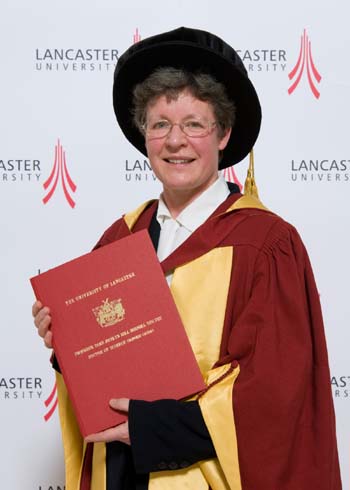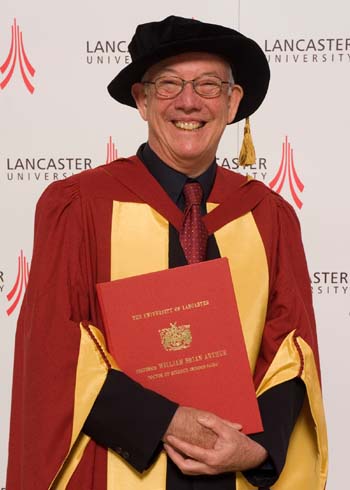Astrophysicist and world-leading economist awarded Honorary Degrees

One of Britain's most distinguished female scientists and a high-profile economist have been awarded honorary degrees by Lancaster University. Professor Dame Jocelyn Bell Burnell -an astrophysicist who helped discover a new type of star - and Professor Brian Arthur, an economist who was one of the pioneers of complexity theory, were awarded their degrees by Lancaster University's Chancellor Sir Chris Bonington on December 9th.
As a PhD student at Cambridge, Professor Bell Burnell was involved in the discovery of pulsars - highly magnetised dead stars that emit radio waves along their magnetic poles. This discovery opened up a new branch of astrophysics and was later recognised by the award of a Nobel Prize to her supervisor.
She has since received many honours and awards from American and British scientific bodies for her contributions to science. She has been President of the Royal Astronomical Society and in 2008 became the first female President of the Institute of Physics.
In her quest for further knowledge she has used telescopes flown on high-altitude balloons, launched on rockets and carried on satellites. As a high profile speaker and broadcaster she has done much to advance public understanding of science and provided an important role model to women considering a career in the field.
Lancaster University Alumnus Professor W. Brian Arthur is one of the most distinguished and creative economists in the world. A pioneer in the science of complexity, he has written extensively about technology and how it evolves.

Professor Arthur who originally trained as an electrical engineer, is best known for his theoretical work on increasing returns in the economy. Recently he has turned his attention to questions of the evolution of technology and its role in shaping our world – from the economy to scientific discovery.
The first in his family to attend university, he is currently a professor at the Santa Fe Institute in New Mexico. He holds a PhD in Operations Research from Berkeley, an MA in Operational Research at Lancaster University along with other degrees in economics, maths and electrical engineering. In 1990 his work won the Schumpeter Prize in economics and in 2008 he won the Lagrange Prize in complexity science.
He is a sought after speaker and he has given keynote speeches to governments and companies all over the world, from the White House and the World Economic Forum to Coca-Cola and Intel.